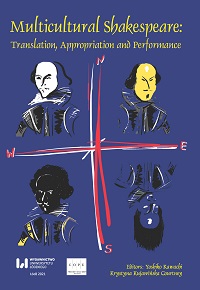“No beast so fierce but knows some touch of pity”: Compassion and the Nonhuman in "Richard III"
DOI:
https://doi.org/10.18778/2083-8530.24.08Słowa kluczowe:
Richard III, compassion, emotion, posthumanism, human-animal binaryAbstrakt
When Lady Anne accuses Richard of cruelty in the wooing scene of act one in Richard III, she claims that even the fiercest beast will demonstrate some degree of pity. Her attempt to categorize Richard as somehow both less than human and less than a beast, however, leaves her vulnerable to Richard’s pithy retort that he knows no pity “and therefore [is] no beast” (1:2:71-2). The dialogue swiftly moves on, but the relation between the emotional phenomenon known as pity or compassion and the nonhuman, briefly raised in these two lines, remains unresolved. Recent scholarship at the intersection of early modern studies, historical animal studies and posthumanism has demonstrated ways in which the human-animal binary is often less than clearly articulated in the sixteenth and seventeenth centuries. Building on such work, and adding perspectives from the history of the emotions, I look closely at the exchange between Anne and Richard as characteristic of pre-Cartesian confusion about the emotional disposition—in particular compassion—of animals. I argue that such confusion can in fact be traced throughout Richard III and elsewhere in the Shakespeare canon and that paying attention to it unsettles the more familiar notion of compassion as a human species distinction and offers a new way to read the early modern nonhuman.
Pobrania
Bibliografia
Alkemeyer, Bryan. ‘“I am the Dog”: Canine Abjection, Species Reversal, and Misanthropic Satire in The Two Gentlemen of Verona’. The Routledge Handbook of Shakespeare and Animals. Ed. Holly Duggan and Karen Raber. London and New York: Routledge, 2021. 34-44 https://doi.org/10.1590/0101-3173.2021.v44dossier.15.p265
Google Scholar
DOI: https://doi.org/10.4324/9781003057192-5
Bovilsky, Lara. ‘Shakespeare’s Mineral Emotions’. Renaissance Posthumanism. Ed. Joseph Campana and Scott Maisano. New York: Fordham University Press, 2016. 253-282.
Google Scholar
DOI: https://doi.org/10.5422/fordham/9780823269556.003.0009
Campana, Joseph and Scott Maisano. Introduction. Renaissance Posthumanism. Ed. Joseph Campana and Scott Maisano. New York: Fordham University Press, 2016. 1-44.
Google Scholar
DOI: https://doi.org/10.5422/fordham/9780823269556.003.0011
Derrida, Jacques. ‘The Animal That Therefore I Am (More to Follow)’. Trans. David Willis. Critical Inquiry 28.2 [1997] (2002): 369-418 https://doi.org/10.1086/449046
Google Scholar
DOI: https://doi.org/10.1086/449046
Descartes, René. Discourse on the Method. Trans. John Veitch. New York: Cosimo Classics, [1637] 2008.
Google Scholar
Duggan, Holly and Karen Raber, eds. The Routledge Handbook of Shakespeare and Animals. London and New York: Routledge, 2021.
Google Scholar
Fudge, Erica. Brutal Reasoning: Animals, Rationality, and Humanity in Early Modern England. Ithaca, New York, and London: Cornell University Press, 2006.
Google Scholar
DOI: https://doi.org/10.7591/9781501727191
Fudge, Erica. Perceiving Animals: Humans and Beasts in Early Modern English Culture. Basingstoke and New York: Palgrave, 2000.
Google Scholar
DOI: https://doi.org/10.1007/978-1-349-62415-7
Fudge, Erica. Pets. Stockfield: Acumen, 2008.
Google Scholar
DOI: https://doi.org/10.1017/UPO9781844654253
Fudge, Erica. Quick Cattle and Dying Wishes: People and their Animals in Early Modern England. Ithaca, New York and London: Cornell University Press, 2018.
Google Scholar
DOI: https://doi.org/10.7591/cornell/9781501715075.001.0001
Fudge, Erica, ed. Renaissance Beasts: Of Animals, Humans and Other Wonderful Creatures. Urbana and Chicago: University of Illinois Press, 2004.
Google Scholar
Haraway, Donna J. When Species Meet. Minneapolis and London: University of Minnesota Press, 2008.
Google Scholar
Ibbitt, Katherine and Kristine Steenberg, (eds.). Compassion in Early Modern Literature and Culture: Feeling and Practice. Cambridge: Cambridge University Press, 2021.
Google Scholar
Kott, Jan. Shakespeare Our Contemporary. Trans. Boleslaw Taborski. London: Methuen & Co, 1965.
Google Scholar
Montaigne, Michel de. The Complete Essays. Trans. M.A. Screech. London: Penguin, [1580] 2003.
Google Scholar
Paster, Gail Kern. ‘Melancholy Cats, Lugged Bears, and Other Passionate Animals: Reading Shakespeare’s Psychological Materialism across the Species Barrier’. Reading the Early Modern Passions: Essays in the Cultural History of Emotions. Ed. Gail Kern Paster, Katharine Rowe and Mary Floyd-Wilson. Philadelphia: University of Pennsylvania Press, 2004. 113-129.
Google Scholar
Raber, Karen. Animal Bodies, Renaissance Culture. Philadelphia: University of Pennsylvania Press, 2013.
Google Scholar
DOI: https://doi.org/10.9783/9780812208597
Raber, Karen. Shakespeare and Posthumanist Theory. London and New York: The Bloomsbury Arden Shakespeare, 2018.
Google Scholar
Rosendahl Thomsen, Mads and Jacob Wamberg. Introduction. The Bloomsbury Handbook of Posthumanism. Ed. Mads Rosendahl Thomsen and Jacob Wamberg. London and New York, Bloomsbury, 2020. 1-10.
Google Scholar
DOI: https://doi.org/10.5040/9781350090507.ch-00I
Shannon, L. The Accommodated Animal: Cosmopolity in Shakespearean Locales. Chicago and London: University of Chicago Press, 2013.
Google Scholar
DOI: https://doi.org/10.7208/chicago/9780226924182.001.0001
Steenbergh, Kristine. ‘Compassion and the Anthropocene’. Compassion in Early Modern Literature and Culture: Feeling and Practice. Ed. Katherine Ibbitt and Kristine Steenbergh. Cambridge: Cambridge University Press, 2021. 293-301.
Google Scholar
DOI: https://doi.org/10.1017/9781108862172.024
Topsell, Edward. The historie of foure-footed beastes. London: William Iaggard, 1607.
Google Scholar
Wright, Thomas. The Passions of the Minde in Generall. Corrected, enlarged, and with sundry new discourses augmented. London: Valentine Simmes and Adam Islip for Walter Burre and Thomas Thorpe, 1604.
Google Scholar
Pobrania
Opublikowane
Jak cytować
Numer
Dział
Licencja

Utwór dostępny jest na licencji Creative Commons Uznanie autorstwa – Użycie niekomercyjne – Bez utworów zależnych 4.0 Międzynarodowe.












